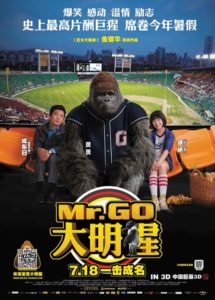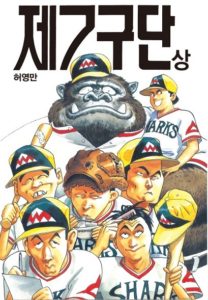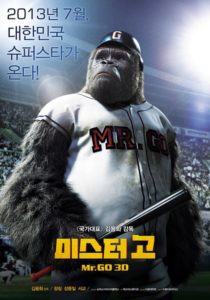Mr. Go
大明猩
South Korea/China, 2013, colour, 1.85, 3-D, 135 mins.
Director: Gim Yong-hwa 김용화 | 金容华.
Rating: 6/10.
Technically impressive but dramatically no-go tale of a baseball-playing gorilla.
China, the present day. The star attraction at Ronghua Circus is a 300-kilo, baseball-playing lowland gorilla named Lingling, trained by 15-year-old Zhao Weiwei (Xu Jiao) who grew up with it and even managed to teach it 2,000 Chinese characters along the way. Lingling was trained in baseball as the circus’ owner, Zhao Weiwei’s grandfather (Byeon Heui-bong), was a fanatical baseball gambler. However, when he died in an earthquake leaving a huge debt, the circus started touring and finally settled in Jilin, in the Yanbian region, northeast China. Still with a debt of RMB6 million, Zhao Weiwei is working hard to keep the circus going and ensure the livelihood of the 45 orphaned children who work in it. Loan shark Lin Xiaogang (Gim Hye-won), head of Tianjin Finance, offers to buy Lingling and cancel the debt, but Zhao Weiwei refuses. Help comes in the form of South Korea’s top sports agent, Seong Chung-su (Seong Dong-il), who offers  her a lucrative contract signing Lingling up to Seoul’s struggling baseball team, Doosan Bears. Zhao Weiwei accepts and goes to South Korea with Lingling, whom Seong Chung-su renames Mr. Go. Zhao Weiwei simply wants to get her money and return home to save the circus, but Seong Chung-su keeps delaying giving her the contract and advance payment, despite the fact that Mr. Go is a huge success and restores Doosan Bears’ fortunes. Meanwhile, in Yanbian, Lin Xiaogang kidnaps the circus’ other, fiercer gorilla – a mountain species named Leiting – and holds it and the circus’ orphans captive, giving Zhao Weiwei three months to come back and settle the debt. Depressed, Zhao Weiwei doesn’t accompany Mr. Go to a game one day, and, without her, the gorilla is unable to function and runs amok in Seoul’s Jamsil Baseball Stadium. As a result, the Korean Baseball Organisation restricts Mr. Go to Doosan Bears’ home games, scuppering Seong Chung-su’s international ambitions. He relaunches Mr. Go as a media star as well, and then arranges a bidding war between two Japanese rival teams, the Chunichi Dragons owned by Ito Hiroshi (Odagiri Joe) and Yomiura Giants owned by Inoue Daichi (Hiroto Tamura).
her a lucrative contract signing Lingling up to Seoul’s struggling baseball team, Doosan Bears. Zhao Weiwei accepts and goes to South Korea with Lingling, whom Seong Chung-su renames Mr. Go. Zhao Weiwei simply wants to get her money and return home to save the circus, but Seong Chung-su keeps delaying giving her the contract and advance payment, despite the fact that Mr. Go is a huge success and restores Doosan Bears’ fortunes. Meanwhile, in Yanbian, Lin Xiaogang kidnaps the circus’ other, fiercer gorilla – a mountain species named Leiting – and holds it and the circus’ orphans captive, giving Zhao Weiwei three months to come back and settle the debt. Depressed, Zhao Weiwei doesn’t accompany Mr. Go to a game one day, and, without her, the gorilla is unable to function and runs amok in Seoul’s Jamsil Baseball Stadium. As a result, the Korean Baseball Organisation restricts Mr. Go to Doosan Bears’ home games, scuppering Seong Chung-su’s international ambitions. He relaunches Mr. Go as a media star as well, and then arranges a bidding war between two Japanese rival teams, the Chunichi Dragons owned by Ito Hiroshi (Odagiri Joe) and Yomiura Giants owned by Inoue Daichi (Hiroto Tamura).
REVIEW
Laden with impressive statistics – South Korea’s first entirely 3-D-shot movie, three-and-a-half years in production, using specially written visual-effects programmes etc. – baseball-playing gorilla drama Mr. Go 大明猩 is undeniably arresting on a technical level. Of the reported ₩22 billion budget – 25% of which came from China’s Huayi Brothers – half was spent on the visual effects which, mostly using actors wearing motion-capture suits rather than CGI, seamlessly recreate the two gorillas with amazing naturalness. From the very first scene, in which the camera casually pans round to show the heroine juggling balls with the title character, a 300-pound gorilla, the movie integrates its simian protagonists into the human cast in an amazingly offhand way. Added to which, throughout the film no one even comments on the fact that it’s all, surely, a little bit out of the ordinary.
Such is the basic proposition of Mr. Go, which finds a lowland gorilla called Lingling travelling with his teenage trainer (who’s been raised with him) from northeast China to Seoul to reinvigorate a South Korean baseball team and, renamed Mr. Go, make several people very rich. Mainland actress Xu Jiao 徐娇, now 16, is already an old hand with VFX-heavy films (CJ7 长江7号, 2008; Future X-Cops 未来警察, 2010; Starry Starry Night 星空, 2011) and on a technical level bonds absolutely convincingly with her main simian playmate. But by emphasising naturalness over simple ooh-aah spectacle, South Korean director/producer/co-writer/co-editor Gim Yong-hwa 김용화 | 金容华 also plays a high-stakes game – and that’s where Mr. Go becomes a no-go.
 The script, based on the 1984 manga The 7th Team 제7구단 by Heo Yeong-man 허영만 | 许英万 (who also drew the source manga of con-men romp, Tazza 타짜, 2006), simply doesn’t have the emotional content to back up this naturalness in the relationships. Apart from one sequence where Mr. Go runs amok at a game, and a couple of others in which he gazes wistfully across the night skyline towards his real home, director Gim goes out of his way to avoid comparisons with another, better-known (and admittedly much larger) movie gorilla. But even when the whole story of baseball, money and power machinations finally boils down to two gorillas going mano a mano in Seoul’s Jamsil Stadium, the viewer feels zero empathy with either the crippled critter or any of the humans.
The script, based on the 1984 manga The 7th Team 제7구단 by Heo Yeong-man 허영만 | 许英万 (who also drew the source manga of con-men romp, Tazza 타짜, 2006), simply doesn’t have the emotional content to back up this naturalness in the relationships. Apart from one sequence where Mr. Go runs amok at a game, and a couple of others in which he gazes wistfully across the night skyline towards his real home, director Gim goes out of his way to avoid comparisons with another, better-known (and admittedly much larger) movie gorilla. But even when the whole story of baseball, money and power machinations finally boils down to two gorillas going mano a mano in Seoul’s Jamsil Stadium, the viewer feels zero empathy with either the crippled critter or any of the humans.
Despite Gim’s different approach, the screenplay, which took four people to write, is as much a victim of the visual effects as in any other splashier blockbuster. Gim, who began with the progeria comedy Oh! Brothers 오! 브라더스 (2003), hit the local jackpot with fatty comedy 200 Pounds Beauty 미녀는 괴로워 (2006), and followed it with the nationalistic ski-jumping drama Take Off 국가대표(2009), can produce a professional package but has always had problems with pacing. Despite impressive prosthetics, Beauty was 15-20 minutes too flabby; at two-hours-plus, Mr. Go is at least half-an-hour too long, with very little drama or conflict (human or otherwise) in its draggy mid-section and plot threads left dangling.
Leaving aside the fact that the movie seems packaged for four distinct markets (baseball-playing South Korea, Japan and the US, plus 3-D crazy China), actress Xu, as the sole Chinese in the cast, literally seems in her own world throughout the film. This fits her character of a girl just wanting to get back home to pay off her circus’ debts but doesn’t create much empathy with the rest of the cast. The latter – almost entirely South Korean, playing various nationalities – over-act to try to keep the ship afloat. As the nefarious sports agent out to milk the situation, Seong Dong-il 성동일 | 成东日 (better known for TV drama) is largely a one-note wheeler-dealer, while Gim Heui-weon 김희원 | 金熙元 (as a Chinese loan shark) doesn’t even have the minimal depth of Seong’s agent. Japan’s Odagiri Joe 小田切让 bizarrely pops up the later stages as a Nipponese baseball-team owner with a pudding-basin haircut and goofy spectacles.
Other technical credits are on a par with the visual effects, with smooth photography led by Gim’s regular d.p., veteran Bak Hyeon-cheol 박현철 | 朴铉哲, and a big orchestral score by Yi Jae-hak 이재학 | 李在鹤 that does the business in a mechanical way but evokes no real emotion. The original Korean title 미스터 고 is simply Kringlish for “Mr. Go”; the Chinese title literally means “Big Ape” but also sounds exactly like “Big (Film) Star” 大明星 in Mandarin. The gaping plot hole of why Lingling was trained to play baseball (not a popular sport in China, but very popular in US-influenced South Korea and Japan) is explained away not very convincingly early on in the movie. A coda promises a sequel centred on American football, which may prove equally alien to territories not familiar with the sport.
CREDITS
Presented by Showbox/Mediaplex (SK), Dexter Digital (SK), Huayi Brothers Media (CN). Produced by Dexter Degital (SK).
Script: Gim Yong-hwa. Adaptation: Gim Yong-hwa, Gim Jong-hyeon, Gim Hyeon-cheol. Original script: Gim Nam-gyu. Original manga: Heo Yeong-man. Photography: Bak Hyeon-cheol, Jeon Dae-seong. Editing: Gim Jin-o, Gim Yong-hwa. Music: Yi Jae-hak. Production design: Yang Hong-sam. Costume design: Chae Gyeong-hwa. Sound: Yi Seung-cheol, Yi Seong-jin. Action: Hong Ui-jeong. Visual effects: Jeong Seong-jin (Dexter Digital). Special effects: Hong Jang-pyo. 3-D producer: Chuck Chae.
Cast: Xu Jiao (Zhao Weiwei), Seong Dong-il (Seong Chung-su), Odagiri Joe (Ito Hiroshi, Chunichi Dragons owner), Gim Heui-weon (Lin Xiaogang), Gim Gang-u (Gim, Doosan Bears general manager), Gim Jeong-tae (NC Dinos general manager), Gim Eung-su (Jin Yun-tae, Korean Baseball Organisation commissioner), Jeong In-gi (Gong In-gu, KBO secretary-general), Jo Jae-yun (doctor), Gim Heung-rae (Lingling/Mr. Go), Yi Jun-hyeok (Leiting/Zeroz), Gim Gi-cheon (circus manager), Gim Go-eun (Xiuni/Sunny, circus orphan), Gim Ye-won (Zhuni/Junny, circus orphan), Gim Hong-su (Lin Xiaogang’s henchman), Shin Se-yong (bamboo tube man), Na Ju-ho (fan signal man), Hiroto Tamura (Inoue Daichi, Yomiura Giants owner), Gim Jeong-seok (Doosan Bears director), Seong Mun-su (NC Dinos director), Gim Ji-yeong (young Weiwei), Jesse Day (Frederic Pearl, Primate Protection Association representative), Yun Yuk, Gim Hak-ryeong (sports commentators), Yu Seung-ho, Yi Jae-ho (sportscasters), Byeon Heui-bong (Zhao Weiwei’s grandfather), Don Lee (baseball commentator), Jeong Ji-yun (herself, home-shopping show host), Gim Jeong-eun (herself, TV musical show MC), Chu Shin-su (himself, baseball player), Ryu Hyeon-jin (himself, baseball player), Gim Seong-ju (himself).
Release: South Korea, 17 Jul 2013; China, 18 Jul 2013.
(Review originally published on Film Business Asia, 28 Aug 2013.)
